
Guests
- Shahed Ghoreishiformer top press officer for Israeli-Palestinian affairs at the State Department.
Shahed Ghoreishi was fired from his position as a press officer for Israeli-Palestinian affairs at the U.S. State Department earlier this week. While no official explanation was given, Ghoreishi was involved in multiple departmental disputes over how to characterize U.S. positions on Israel’s forced expulsion of Palestinians from Gaza and the killings of Palestinian journalists. In a TV broadcast exclusive, Ghoreishi speaks to Democracy Now! about his firing and what it may tell us about the Trump administration’s future policy in Israel and Palestine.
Transcript
AMY GOODMAN: This is Democracy Now!, democracynow.org, The War and Peace Report. I’m Amy Goodman.
Earlier this week, the top State Department press officer on Israeli-Palestinian affairs, Shahed Ghoreishi, was fired from his position without explanation. The firing comes after several internal debates at the State Department regarding how to characterize U.S. positions on Israel’s war in Gaza, according to internal State Department records reviewed by The Washington Post.
In the most recent dispute before his firing, Ghoreishi had drafted a line for a press release in response to the controversial Israeli plan to relocate hundreds of thousands of Palestinians from the Gaza Strip. The proposed line read, quote, “We do not support forced displacement of Palestinians in Gaza,” unquote. Despite similar language being used by both President Trump and Middle East envoy Steve Witkoff earlier this year, it was struck from the statement by State Department leadership.
Another recent dispute followed the targeted killing of the well-known Palestinian journalist Anas al-Sharif of Al Jazeera and five other journalists in a press tent in Gaza. Ghoreishi recommended a line that said, quote, “We mourn the loss of journalists and express condolences to their families,” unquote. That line was also rejected.
According to The Washington Post, a key figure in the internal disputes was David Milstein, a top adviser to the U.S. ambassador to Israel, Mike Huckabee. In one direct disagreement, Milstein had pushed for the State Department to refer to the West Bank as “Judea and Samaria,” a biblical name for the area that’s widely used within Israel, but “West Bank” is the internationally recognized name and the previously approved State Department language. Ghoreishi managed to cut the line.
We go now to Washington, D.C., where we’re joined by Shahed Ghoreishi in his first broadcast interview.
Welcome to Democracy Now! Explain what took place —
SHAHED GHOREISHI: Thank you.
AMY GOODMAN: — what you were told. And what about these controversies that led up to your firing?
SHAHED GHOREISHI: Thanks, Amy.
I have been a press officer at the State Department since September. I’ve been covering Israeli-Palestinian affairs since January. I had a good relationship with the civil servants there. I had a good relationship with even the political appointees there. You don’t get this role on a whim.
However, I believe that basic U.S. interests and human decency were important in my role. And last week, I think three events from Sunday, Monday and Tuesday built up to aggravate the radical ideologues at the State Department and in Embassy Jerusalem to lead to my firing. Sunday was the terrible killing and murder of Anas and his colleagues. And Monday was the line about forced displacement, essentially ethnic cleansing. And Tuesday, I cut the line regarding Judea and Samaria. These built up. And despite the goodwill that I had in the bureau, it looks like that senior officials, like Milstein in Embassy Jerusalem, and people from the secretary’s office at the State Department both combined to get me fired by the end of the week.
AMY GOODMAN: So, explain exactly what they said when you wanted to express condolences to these families of civilians, of journalists that died in an Israeli airstrike. Israel immediately claimed responsibility for the killing of Anas and his colleagues.
SHAHED GHOREISHI: Well, they immediately said, “We can’t provide condolences, because Israel has claimed — we don’t know. Israel — we don’t know exactly what happened here, and Israel has claimed that he was a member of Hamas.” I have an issue with relying on Israelis for every intelligence and comment. So, we should be able to pause and evaluate things. If they had said, “Hey, we’re going to wait 48 hours and confirm,” that could be one thing, but immediately deferring to the Israelis is highly problematic.
AMY GOODMAN: And, of course, Israel never provided evidence of this, and they never claimed that the five other journalists were members of Hamas.
SHAHED GHOREISHI: They never do so.
AMY GOODMAN: So, talk about —
SHAHED GHOREISHI: Yeah, they — yeah.
AMY GOODMAN: Talk about who Milstein is, one of your key opponents, the senior adviser to Mike Huckabee, the U.S. ambassador to Israel.
SHAHED GHOREISHI: Look, he’s someone who is influential and close with Ambassador Huckabee. He will communicate and have a lot of influence in the building. He’s well known for pushing his agenda within the building.
And I think that’s highly problematic, because we have these very impressive and hard-working civil servants in the building who are going through a process every single day, whether it be policy memos, press statements, to put the facts out there. And even if it’s — obviously, there’s — we have President Trump’s administration. It’s his prerogative. But the facts matter, so that the agenda is in line with reality.
However, folks like Milstein and his allies, which are a very small group in the grand scheme of things in the building, don’t care about guardrails. In fact, the guardrails is what aggravates them.
AMY GOODMAN: Of course —
SHAHED GHOREISHI: So, even when you say — go ahead.
AMY GOODMAN: The debate around calling the West Bank “Judea and Samaria” goes to the House Speaker Mike [Johnson], who made this visit to an Israeli settlement in the West Bank —
SHAHED GHOREISHI: Yeah.
AMY GOODMAN: — after an unannounced trip to Israel. Johnson used his visit to declare, quote, “The mountains of Judea and Samaria are the rightful property of the Jewish people.” How did you win this fight not to say “Judea and Samaria” in an official State Department press release?
SHAHED GHOREISHI: It’s a good question. I want to emphasize that even though I have an influential role as a press officer, every single time something goes out, it requires input from the entire building. I can’t go and release a statement unilaterally.
So, when it comes to Judea and Samaria, we have these — just for give some background for the audience, on days that the State Department holds daily press briefings, which the current schedule has tended to be Tuesdays and Thursdays, I have these packets of press guidance. It’s pages of possible reporter questions and sample responses. And then, before they go to the podium to brief reporters, the press officers will take turns, by bureau, to brief the spokesperson.
Now, I was clearing, which means basically going through the approval process — I was clearing my packet that morning. Now, what’s interesting is that Embassy Jerusalem, even though they’re influential and normally should be in my doc, they let David Milstein lead. He doesn’t always have the either time or whatever it is to go into my docs every day. So, I had to get the surprise, once every, let’s say, two to three weeks, he would jump in and edit my docs. So, he did his classic surprise morning edits, where he goes through and adds all these edits, that don’t have precedent necessarily, and so some are approved. I usually go to other colleagues in the building and say, “Hey, these edits came in, like, late in the process. Let’s go through each one.” And I’ll say that even though I was the one who flagged my concern about Judea and Samaria first, I was not the only one in the building that shared that concern. So —
AMY GOODMAN: So, let me ask you about that.
SHAHED GHOREISHI: — I cut the line. Yeah.
AMY GOODMAN: How much dissent is there within the State Department when it comes to Israel-Palestine? I mean, today’s top headline is that the U.N. has now declared famine in Gaza.
SHAHED GHOREISHI: Look, people are — people read the headlines. They’re perfectly aware. They’re — I want to — I want to emphasize that, in a general sense, the civil servants there are doing their job. They know their role. They recognize the administration they’re under and the prerogative. But at the same time, people are aware that, especially in the press context — look, you know, policy is one thing, and there are obviously major, major concerns there. But just on the press side, being empathetic, a bit more empathetic, just at least showing concern, is just a basic press advice. And so, people are concerned about the aggressive language.
And now when someone like Milstein and the secretary’s office clamp down and fire someone like me, that puts a chilling effect on people who might give that advice, that we need to call this out or be more empathetic or try to deliver things with a bit more human decency. So, there’s a real, real chilling effect throughout the building, especially after I’m gone.
AMY GOODMAN: What are your plans now? Do you plan to speak out on Israel-Palestine? And your response to the State Department telling The Washington Post, “The Department has zero tolerance for employees who commit misconduct by leaking”? Your response?
SHAHED GHOREISHI: So, on my future plans, I am going to speak out. My intention is not to be out there forever. I don’t need extended attention or anything. So, if people find this helpful, I think it’s extremely important to speak out. But my intention isn’t about me. I think it’s — I think it’s about the — how radical our policy is becoming, not just on policy, but language, as well. So, I think that’s important to flag, and I will do that for the time being. And I will figure out my future plans moving forward.
Now, those lines are baseless, and reporters have their own ways of confirming details. So, you know, that’s up to The Washington Post. However, in terms of — there’s another line that they mentioned about being the agenda and the policy of the president. Let me just say that I — if I was an activist within the building, I would have been fired long earlier than August. I would — I was a believer in the process and the guardrails, and a believer in human decency. And that eventually did get me fired. But I may have lasted this long because of the goodwill I had in the building. But at the end of the day, those quotes from the State Department don’t make any sense.
AMY GOODMAN: Shahed Ghoreishi, I want to thank you so much for being with us, former top press officer for Israeli-Palestinian affairs at the State Department, fired by the State Department.
Coming up, we learn about an immigrant day laborer who died after a Home Depot raid as he ran into traffic. We’ll hear from his family in Guatemala, and we’ll talk to a day laborer activist. Stay with us.
[break]
AMY GOODMAN: “Hielo,” “Ice,” by La Santa Cecilia in our Democracy Now! studio.

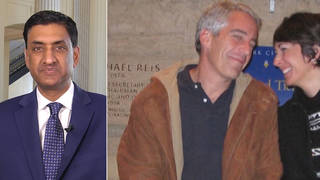
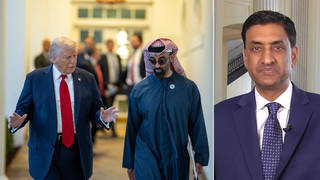
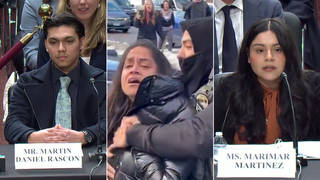
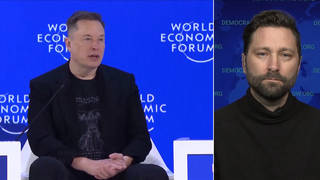





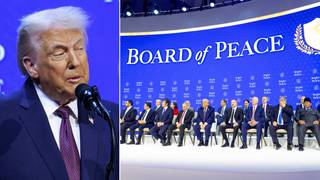

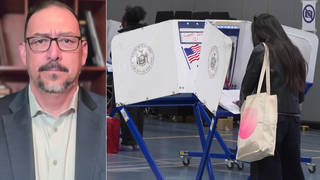
Media Options